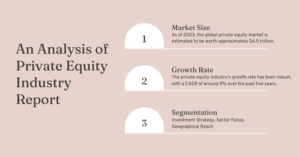
The private equity industry has seen substantial growth over the past decade, emerging as a crucial component of the global economy. As of 2023, the global private equity market is estimated to be worth approximately $4.5 trillion. This impressive valuation reflects the increasing attractiveness of private equity investments, driven by the industry’s ability to deliver high returns compared to traditional investment avenues.
 Source- Ken Research
Source- Ken Research
The private equity industry’s growth rate has been robust, with a compound annual growth rate (CAGR) of around 9% over the past five years. This growth is underpinned by a favorable economic environment, increased investor interest, and the proliferation of private equity firms globally. The industry’s resilience during economic downturns, such as the COVID-19 pandemic, has further solidified its reputation as a reliable and lucrative investment option.
Growth Factors
Several key factors have contributed to the growth of the private equity industry:
- Institutional Investor Demand: Institutional investors, including pension funds, sovereign wealth funds, and endowments, have significantly increased their allocations to private equity. These investors are attracted by the potential for higher returns and diversification benefits that private equity offers.
- Economic Conditions: A low-interest-rate environment has pushed investors to seek higher yields in alternative investments. Private equity provides an avenue for achieving superior returns compared to traditional fixed-income investments.
- Technological Advancements: Technological innovation has opened new opportunities for private equity firms to invest in high-growth sectors such as fintech, healthtech, and green technologies. This has driven substantial capital inflows into these areas.
- Globalization: The globalization of capital markets has allowed private equity firms to expand their reach, accessing diverse investment opportunities across different regions. This geographical diversification helps mitigate risks and enhance returns.
- Regulatory Changes: Regulatory reforms in various countries have created a more favorable environment for private equity investments. These changes have facilitated fundraising, investment, and exit opportunities, contributing to the industry’s expansion.
Private Equity Industry Segmentation
The private equity industry can be segmented based on several criteria, including investment strategy, sector focus, and geographical reach. Understanding these segments is crucial for investors and stakeholders looking to navigate the complex landscape of private equity.
- Investment Strategy:
- Buyouts: This involves acquiring a controlling stake in a company, often with the aim of improving its operations and financial performance before exiting at a profit.
- Venture Capital: Focuses on investing in early-stage companies with high growth potential, particularly in the technology and innovation sectors.
- Growth Equity: Targets investments in mature companies that require capital to expand or restructure operations, enter new markets, or finance significant acquisitions.
- Distressed Investments: Involves buying companies in financial distress at a discounted price, with the aim of turning them around for a profit.
- Sector Focus:
- Private equity firms often specialize in specific sectors such as healthcare, technology, consumer goods, industrials, and energy. This specialization allows firms to leverage sector-specific expertise and networks to drive value creation.
- Geographical Reach:
- Firms may operate on a global, regional, or local scale. Global firms have a diversified portfolio across multiple regions, while regional and local firms focus on specific markets where they have deep knowledge and connections.
Target Audience of Private Equity Market
The target audience for the private equity industry is diverse, encompassing a wide range of stakeholders who contribute to and benefit from the industry’s activities:
- Institutional Investors: These include pension funds, endowments, sovereign wealth funds, insurance companies, and family offices. Institutional investors are the primary source of capital for private equity funds, seeking to enhance their portfolios’ returns through alternative investments.
- High Net Worth Individuals (HNWIs): Wealthy individuals often invest in private equity either directly or through funds. They are attracted by the potential for high returns and the opportunity to invest in exclusive and high-growth opportunities.
- Private Equity Firms: These firms manage funds and make investments in target companies. They include general partners (GPs) who manage the funds and limited partners (LPs) who provide the capital.
- Portfolio Companies: The companies that receive investments from private equity firms. These companies benefit from the capital, strategic guidance, and operational expertise provided by private equity investors.
- Advisory and Service Providers: This includes legal, financial, and consulting firms that support private equity transactions. They play a crucial role in facilitating deal-making, due diligence, and post-investment management.
Conclusion
The private equity industry report highlights the significant growth and development of this dynamic sector. With a market size of approximately $4.5 trillion and a robust growth rate, the industry continues to attract substantial interest from institutional investors, high net worth individuals, and other stakeholders. Key growth factors such as increased institutional demand, favorable economic conditions, technological advancements, globalization, and regulatory changes have propelled the industry forward.
Segmentation within the industry, based on investment strategy, sector focus, and geographical reach, provides diverse opportunities for investors and firms to capitalize on. The target audience for the private equity industry is wide-ranging, encompassing institutional investors, HNWIs, private equity firms, portfolio companies, and advisory service providers.









